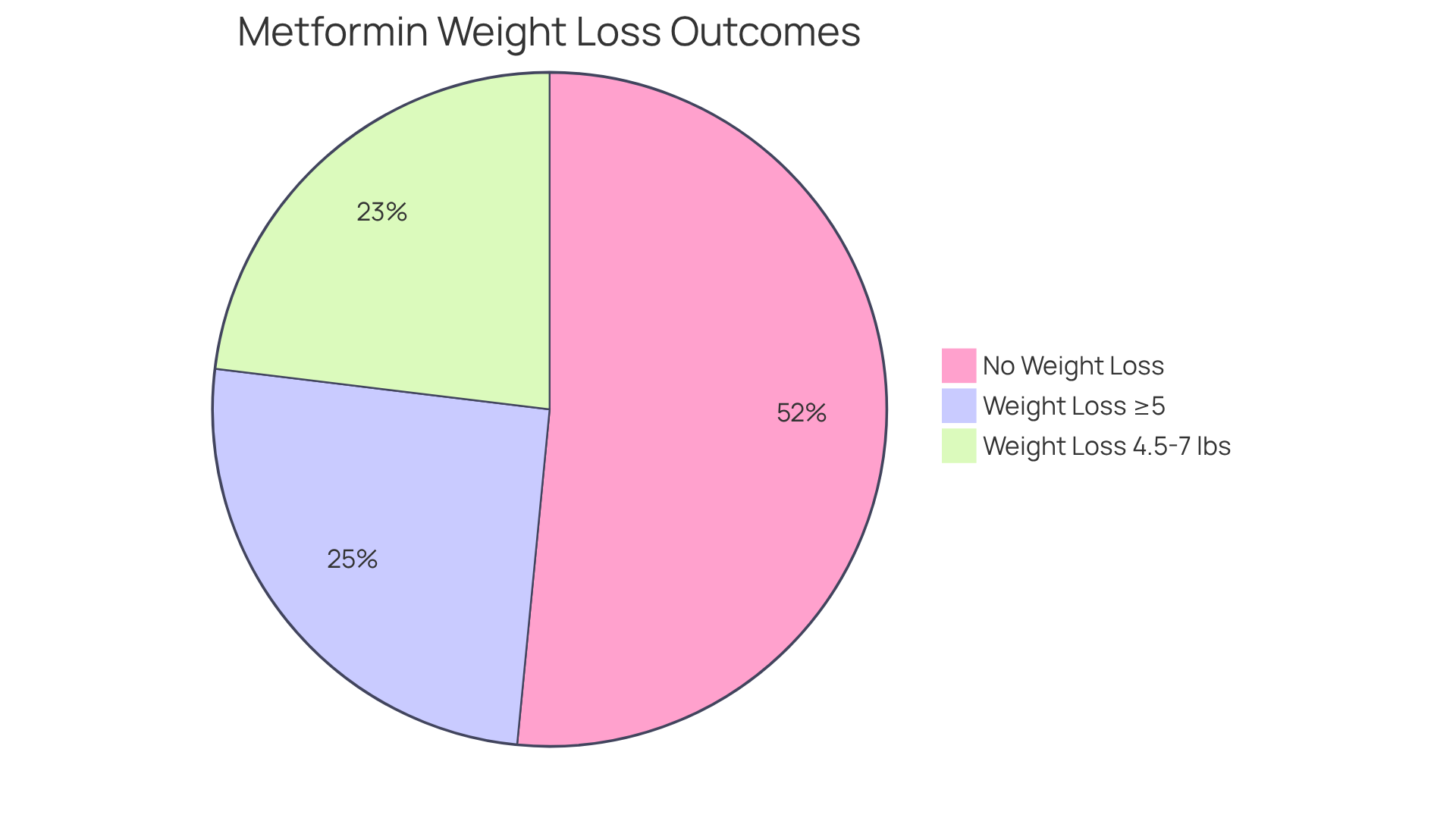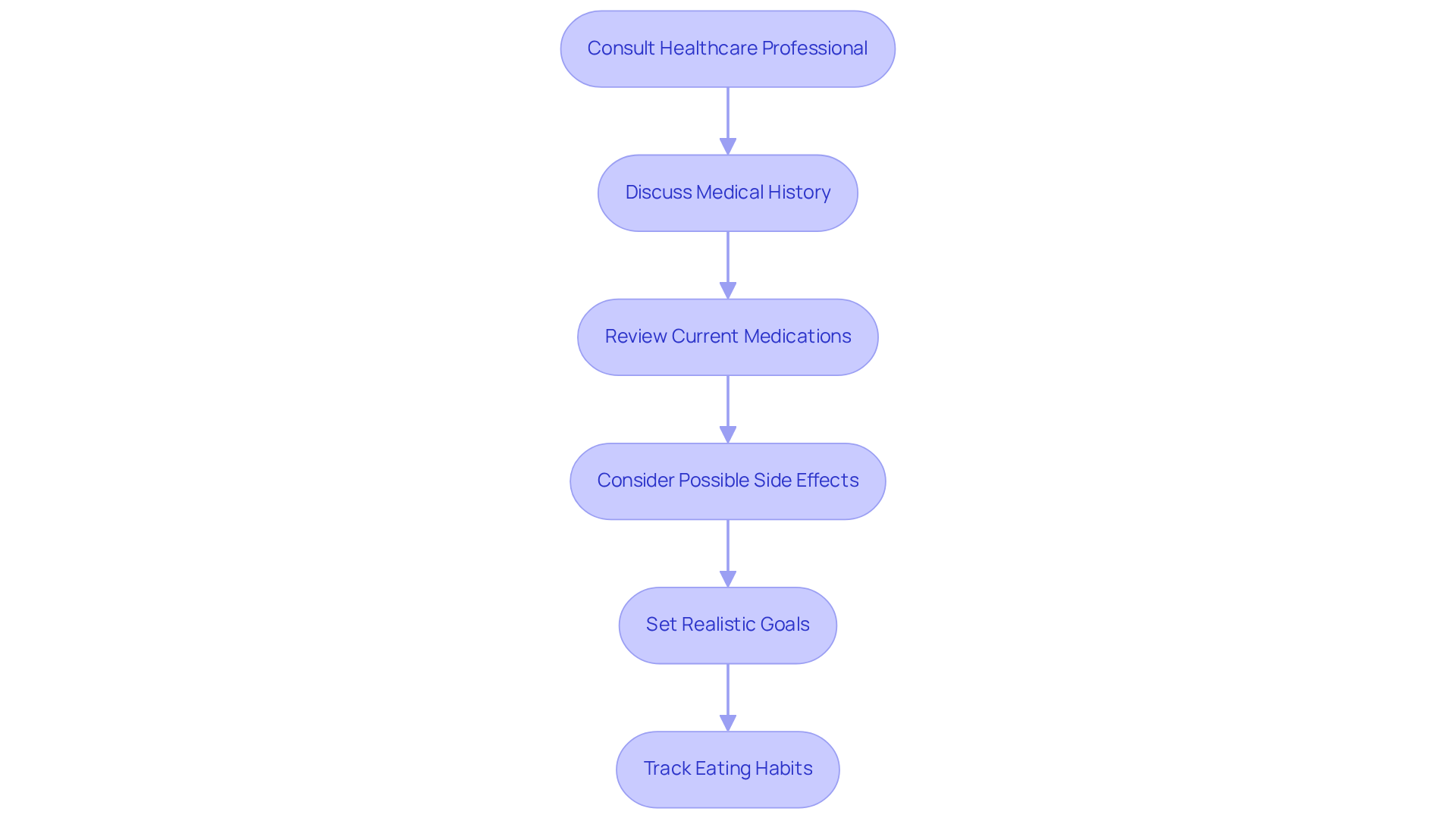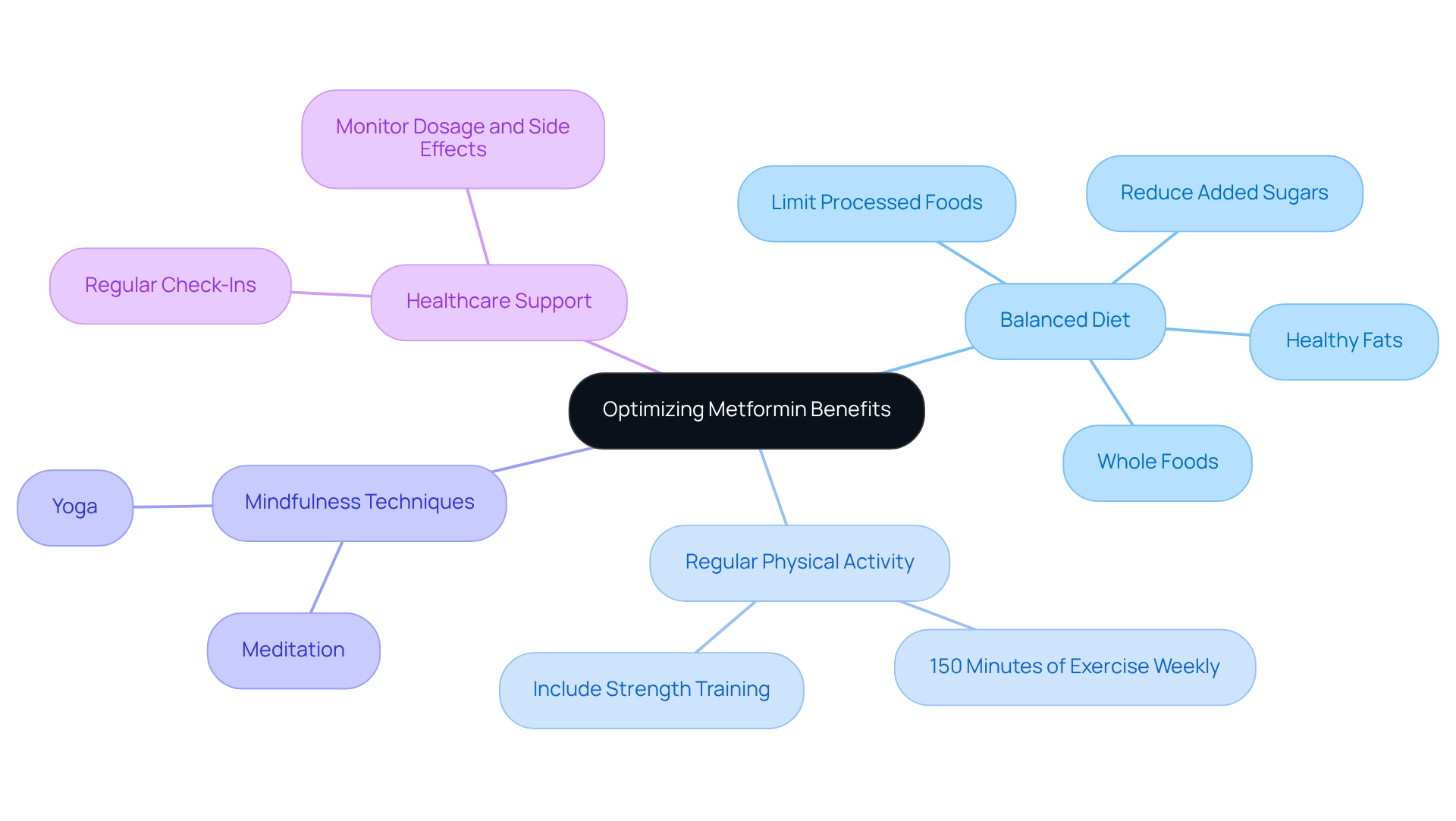Overview
This article addresses the challenges individuals face in their weight loss journey, particularly when using Metformin, a medication primarily for managing type 2 diabetes. Have you ever felt overwhelmed by the process of losing weight? You’re not alone. Metformin can support modest weight loss by suppressing appetite and improving insulin sensitivity. However, it’s crucial to remember that lifestyle changes play a significant role in this journey.
Regular monitoring and guidance from healthcare professionals can greatly enhance your weight loss efforts. Together, we can achieve your goals by making informed choices and seeking support. Remember, you’re not in this alone; we’re here for you. Embrace this journey with an open heart and a commitment to your health. With the right approach, you can make strides toward a healthier you.
Introduction
Metformin, a well-established medication for managing type 2 diabetes, is gaining recognition for its potential role in weight loss. Many users report a modest reduction in body weight, making this medication an intriguing option for those facing the challenges of obesity. Yet, the journey of losing weight on metformin can be daunting.
How can individuals effectively navigate this path while embracing lifestyle changes and tracking their progress? This guide offers a comprehensive roadmap designed to help you harness the benefits of metformin, ensuring a more successful and fulfilling weight loss experience. Together, we can achieve your goals and foster a healthier future.
Understand Metformin and Its Role in Weight Loss
Metformin has been a trusted ally in managing type 2 diabetes for over 66 years, and it’s now capturing attention for its potential benefits in weight loss. By enhancing insulin sensitivity, this medication helps your body utilize glucose more effectively, which can lead to reduced fat storage. If you’re considering this option, research shows that individuals losing weight on metformin may experience a modest weight loss of about 4.5 to 7 pounds, or roughly 2% to 3% of their body weight, within the first year. This reduction is largely due to the appetite-suppressing effects of the medication and its ability to influence gut microbiota, which can support improved metabolic health.
It’s encouraging to note that approximately one in three people taking this medication lose at least 5% of their body weight after a year. This highlights metformin’s potential as a helpful tool for those facing obesity. However, it’s important to remember that while metformin can assist in weight loss, it is not FDA-approved for this purpose. The maximum dosage is 2,550 milligrams daily, and it remains a cost-effective option, typically costing between $10 and $30 for 30 tablets.
For those seeking a more personalized approach to weight loss, Minimal offers compounded tirzepatide, designed to enhance your weight loss journey through its unique mechanisms, starting at $99.99 per month. Understanding these options is vital for anyone considering metformin or compounded tirzepatide as part of their weight loss strategy. Both can not only help in managing weight but also contribute to overall health improvements. Together, we can navigate this journey towards better health and well-being.
Prepare for Your Weight Loss Journey with Metformin
Before starting this medication, it’s essential to connect with a healthcare professional to ensure it’s the right choice for you, especially if you are expecting or nursing. Have you considered discussing your medical history, current medications, and any possible side effects, such as gastrointestinal discomfort, which may include nausea or diarrhea, particularly in the initial weeks of treatment? It’s important to understand that while Metformin is not FDA-approved specifically for losing weight on metformin, it may help you shed some pounds by reducing appetite and cravings for high-calorie foods.
Establishing realistic goals for weight loss is crucial. Aim for a steady decrease of 1 to 2 pounds each week. Have you thought about keeping a food diary? This can be a helpful tool to track your eating habits and identify areas for improvement. Remember, this preparation stage is about laying a strong foundation for your journey toward a healthier body. Together, we can achieve your goals, and we’re here to support you every step of the way.
Implement Effective Lifestyle Changes Alongside Metformin
To optimize the benefits of metformin for reducing mass, embracing lifestyle modifications is crucial. A balanced diet should be the cornerstone of your approach, emphasizing whole foods such as lean proteins, fruits, vegetables, and whole grains. Have you considered how limiting processed foods, added sugars, and unhealthy fats can support your journey? These changes can significantly enhance your progress.
This medication, while primarily used to manage blood sugar levels in adults with type 2 diabetes, is also believed to assist in losing pounds by regulating insulin response, curbing cravings, reducing glucose production, and limiting fat storage. It works by lowering liver sugar production and enhancing muscle cell sensitivity to insulin, which improves glucose utilization and reduces insulin resistance. This leads to better blood sugar control, making your efforts feel more achievable. Metformin is usually taken by mouth, either with or after meals to reduce the chance of stomach upset. Your doctor will prescribe the correct dosage based on your needs, and it may be taken once or twice daily. Following your dosing schedule is essential to maximize the effectiveness of the medication.
Regular physical activity is equally important; aim for at least 150 minutes of moderate exercise weekly, as recommended by health experts. Including strength training in your routine can further enhance your metabolism, assisting in body management. Research indicates that individuals who paired a specific medication with a structured fitness program saw enhanced results in reducing body mass. Together, we can achieve your goals by integrating these practices into your life.
Moreover, incorporating mindfulness techniques such as yoga or meditation can assist in managing stress, a recognized element that can hinder fat reduction efforts. By concentrating on these comprehensive lifestyle modifications along with metformin, you can establish a viable route toward reaching your goals for reducing body mass. Remember, sustaining these lifestyle adjustments can be challenging over time, as motivation may wane and reduction in body mass can level off. Regular check-ins with healthcare providers can help keep you on track, reminding you that you are not alone on this journey.
Track Your Progress and Adjust Your Plan
Tracking your progress is essential in understanding how well your weight loss journey is unfolding. Regular weigh-ins, along with monitoring health metrics like blood sugar levels, energy, and overall well-being, can provide you with a complete picture of your progress. Have you ever felt stuck in your journey? If you find yourself hitting a plateau while losing weight on metformin—something that can happen—it’s important to reach out to your healthcare provider. They can assist in adjusting your metformin dosage, which typically ranges from 500 to 2,000 mg, tailored to your unique needs and tolerance.
Consider this: a long-term study revealed that individuals who lost more than 5% of their body mass in the first year had a significantly higher chance of maintaining that reduction in the following years. This underscores the importance of being flexible in your approach. Remember, adapting your strategy can be a key factor in achieving sustainable success while losing weight on metformin. Together, we can navigate these challenges and celebrate your victories, no matter how small.
Conclusion
Metformin serves as a multifaceted tool in the journey of weight loss, particularly for those managing type 2 diabetes. By improving insulin sensitivity and suppressing appetite, this medication can facilitate a modest reduction in body weight. However, it’s essential to approach this option with informed guidance from healthcare professionals, as metformin is not specifically approved for weight loss.
Throughout this article, we’ve explored key strategies for maximizing weight loss with metformin. Establishing realistic goals, maintaining a balanced diet, and incorporating regular physical activity are vital steps. Have you considered tracking your progress? Remaining adaptable in your weight loss approach is crucial, and the role of healthcare providers in this process cannot be overstated.
Ultimately, the journey toward weight loss with metformin is not solely about the medication itself. It involves comprehensive lifestyle changes and continuous support. By embracing these practices, you can unlock your potential for improved health and sustainable weight management. Taking the first step towards this journey can lead to significant long-term benefits. Remember, staying informed and proactive in your health choices makes all the difference. Together, we can achieve your goals.
Frequently Asked Questions
What is metformin and its primary use?
Metformin is a medication that has been used for over 66 years to manage type 2 diabetes. It enhances insulin sensitivity, helping the body utilize glucose more effectively.
Can metformin aid in weight loss?
Yes, metformin may aid in weight loss. Research indicates that individuals using metformin for weight loss can expect a modest reduction of about 4.5 to 7 pounds, or roughly 2% to 3% of their body weight, within the first year.
What mechanisms contribute to weight loss when taking metformin?
The weight loss associated with metformin is largely due to its appetite-suppressing effects and its ability to influence gut microbiota, which can support improved metabolic health.
How many people experience significant weight loss on metformin?
Approximately one in three people taking metformin lose at least 5% of their body weight after a year.
Is metformin FDA-approved for weight loss?
No, metformin is not FDA-approved specifically for weight loss, though it can assist in this area.
What is the maximum dosage of metformin?
The maximum dosage of metformin is 2,550 milligrams daily.
How much does metformin typically cost?
Metformin is a cost-effective option, typically costing between $10 and $30 for 30 tablets.
What alternative options are available for weight loss?
An alternative option for weight loss is compounded tirzepatide, which is designed to enhance weight loss through unique mechanisms and starts at $99.99 per month.
Why is it important to understand options like metformin and tirzepatide?
Understanding these options is vital for anyone considering them as part of their weight loss strategy, as both can help in managing weight and contribute to overall health improvements.




















